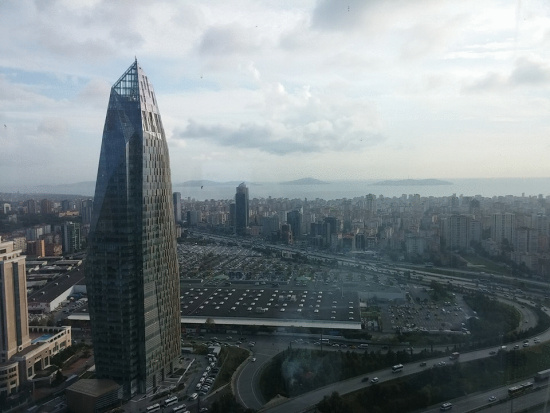Photo: James Tressler
A friend of ours, an English girl, was leaving the city after three years. The going away party was held at a bar in Nevizade Pasaj, one of the many intriguing back streets just off Taksim Square. (Well, it started there anyway, and finished sometime after midnight at a club near the five-star hotel district).
There were about twenty of us that evening, coming and going, mostly teachers and their significant others. As the party began, we were seated at a long table on the rooftop terrace of the bar. The guest of honour, resplendent in her going away dress, moved here and there, giving everyone some attention.
“Are you sure you don’t want to stay?” my wife Özge asked.
“God! Don’t tempt me!” our English friend said. “No – after three years, it’s time. But I’ll definitely be back.”
It was a bittersweet evening, one that most of us have got used to over the years. It goes with the territory: Part of being a teacher here, or Prague, or Beijing, or anywhere, is that you have to get used to the fact that people move on, and usually just at the point where you’ve finally got to know each other.
We drank, raised toasts, talked of our various schools – a new academic year was fast approaching. We talked about our hostess’s plans – she was blissfully without any – for when she returned home to London.We talked about the Syrian refugees, the war, the coming Turkish elections. As the evening wore on, I found that I was happy. Özge and I are homebodies most of the time – when was the last time we were in riotous Taksim on a Saturday evening? Traversing the crowded back streets, you feel you are witness to all the world’s offerings on display: fresh fish, olives, chinaware, Arabic coffee pots; the sizzle and smell of all the food cooking in the restaurants; the flickering faces people of all different colours and races passing by; and music, of course, everywhere music.
That evening in Taksim, as we enjoyed a nice long good-bye with our English friend, I also took the opportunity to catch up with other colleagues I hadn’t seen in quite some time. Most of them had moved on to other schools (the universities pay better, if you don’t mind baby-sitting 21-year-old adolescents), and were living in different parts of the city. They also were happy to finally meet my wife, who they’d only seen on Facebook, and they congratulated us on our recent marriage. I realized that they were all such nice people, and it was a shame that we saw each other so seldom.
The proprietors had already installed a kind of plastic covering to serve as a cover for the rains that would soon come with autumn. But it was transparent, so looking up, you could still see the night sky, the moon hovering like a wrath, a good fairy wishing us all well. All around, you could see the other places lit up, the vast city, all the other people out in the other bars …
“Istanbul is a city best seen from above.” The line, from a book I’d read long ago, trickled into my thoughts over the beer, slipping under the raucous sounds of the bar.
Looking around again at the city, from our night terrace, I thought about many things. Not just our good friend, who was leaving soon, and all the others, but about my own life in Istanbul. For some time, I’d been a bit depressed, especially about my work. I’d grown sick and tired of writing about encroaching disaster, the “dark clouds of war,” the misery of the tragic Syrians.
Not just that: Istanbul can be a trying mistress. With over 14 million souls, she often flies in the face of logic, and turns a fetching, deaf ear to your protests. You sit in traffic morning and night, putting in 12-hour days (your wife fares no better); after a while, even your dreams at times can be haunted by the sounds of a ghostly car horn, the rages of a lost drunken hooligan roaming the streets.
But perhaps what I was missing was a bit of perspective. I felt like those kids in “Dead Poets Society,” who stand on their desktops (“It’s always good to look at things from a different point of view,” the immortal Mr. Keating encourages).
“Istanbul is a city best seen from above.” Of course! It’s all a matter of perspective. Whoever wrote that vanished sentence was right. Rising to a certain level, you can properly observe the grandeur, the scale of Istanbul. I remember upon my arrival, five years ago, ascending to the top of Galata Tower. From that ancient perch, the winds blowing up from the Bosphorus, I had my first glimpse of the city as a whole. You could see the Golden Horn, the two continents meeting in the sunset, the distant Anatolian countryside, a gateway to the Islamic world.
Not that one should necessarily look for “obvious” beauty (sunsets, towers, distant countrysides, etc. The point is that you should always try to remember the good as well as the bad, and that it’s nice to get out once in a while.
“We should do this more often,” I said to my wife, as we sat sleepily in the taxi on the way home. She agreed. In our neighborhood, the streets were all dark and quiet. The other Istanbul, the one we knew by day, was waiting on the other side of the night. But at that moment, it was our city again.
###
James Tressler, a former Lost Coast journalist and resident, is the author of several books, including the recently published “City Scherzos.” He lives in Istanbul.

CLICK TO MANAGE